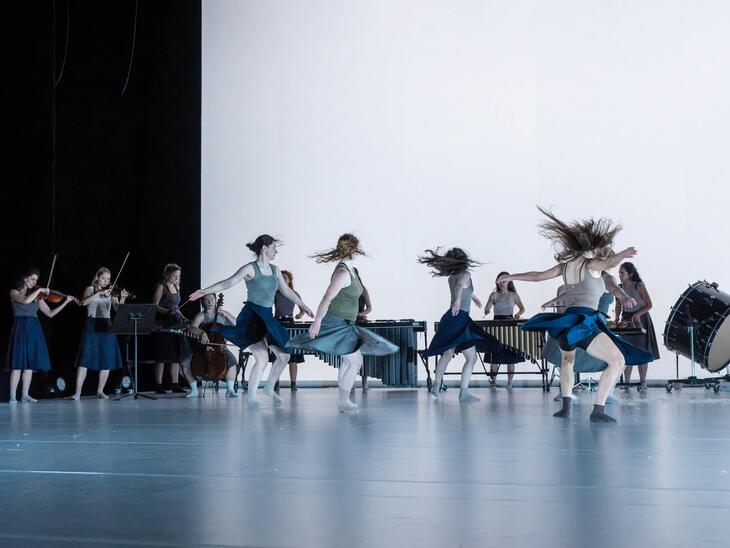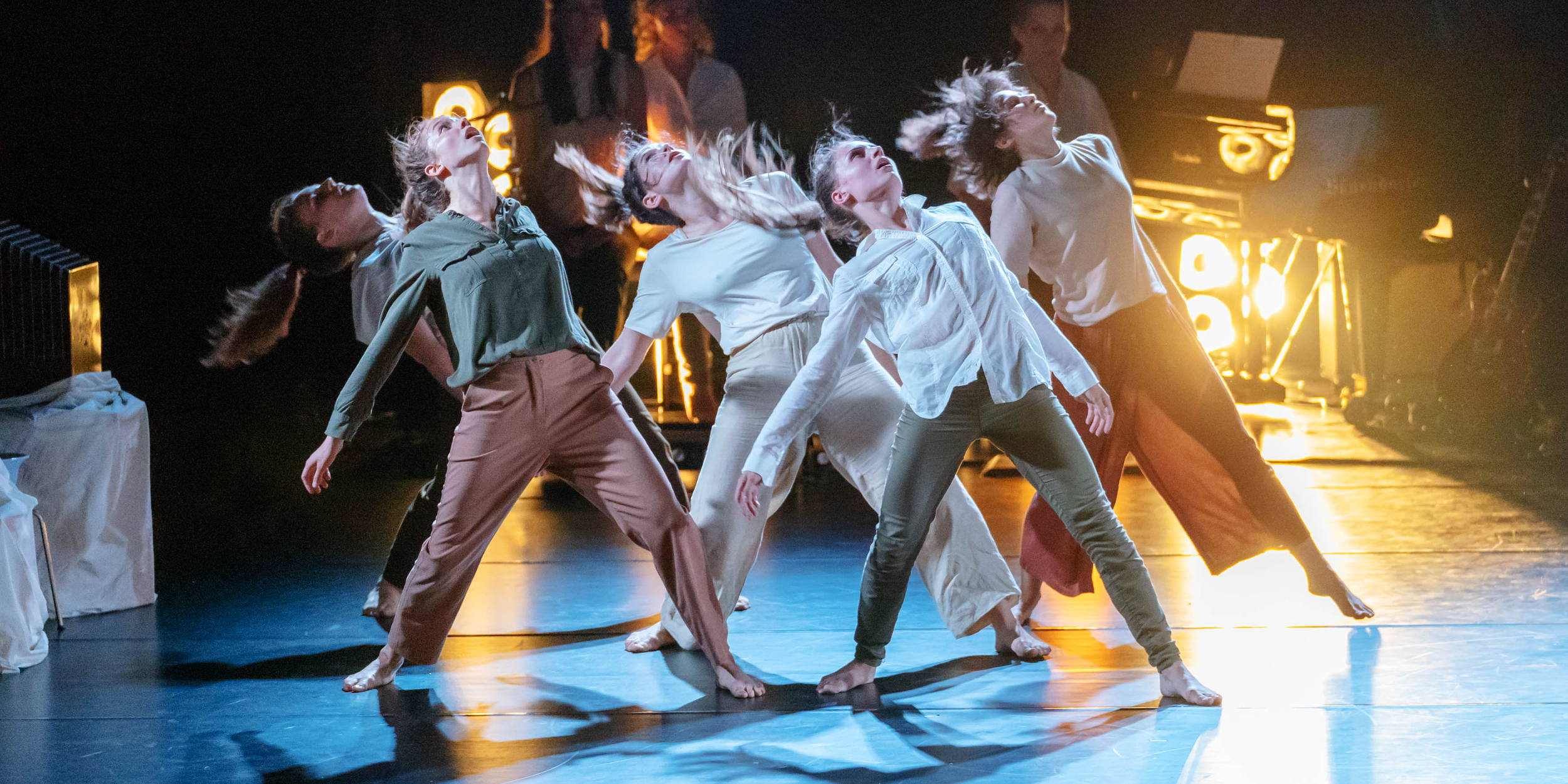
Save the date: The International Summer Course is in preparation and will take place in Salzburg from July 6-12, 2025.
+++ Registration for the entrance examination for teacher training (Art Education and Design:Technology.Textile) still possible until 10th June 2025 - all further information on the course pages! +++

The bachelor's programme qualifies students for a variety of well-established and new professional fields at the intersection of artistic-pedagogical work and social diversity. Students will gain experience of artistic practice and at the same time, undergo training to prepare them for a career in education. Students are empowered to develop creativity-driven approaches to music, dance, and language and to encourage people in their artistic expressiveness; furthermore, they will engage with art forms from the past and present in an interdisciplinary and transdisciplinary manner and learn to initiate diverse encounters with the arts.
Department of Studies & Examinations
+43 676 88122 492
studienabteilung@moz.ac.at
Length of course
8 semesters / 240 ECTS-AP
Language
German
Downloads
The programmes offered at the Orff Institute place a particular emphasis on Carl Orff's model of elemental music and movement education, which is practised and taught under his name in numerous countries. The programme adapts fundamental ideas of the method in a contemporary manner, develops new concepts and creates connections between Orff’s content, methods and principles those of other artistic-pedagogical concepts. The course aims at a versatile professional field with different target and age groups.
The degree programme prepares students for a career in a broad range of professional fields and equips them to work with many different target groups, from early childhood educating geragogy. Elemental music & dance teachers are specialists in artistic-pedagogical groupwork in the field of aesthetic education and the professional qualifications they will acquire during their studies will enable them to develop a variety of professional profiles and to work in the following areas:
The degree programme will further students' creative and design skills as well as their artistic technique. The course is also characterised by a consistent theory-practice relationship: students will receive a theoretical grounding in art pedagogy and educational science, which is complemented by practical placements and teaching tasks. The acquisition and diversification of artistic competences also plays a central part in the course, opening up working methods of contemporary elemental music and dance education, including performative formats. This forms a basis from which skills for teaching music and dance are derived; these are then transferred into diverse, constantly reforming artistic-pedagogical contexts, with special consideration given to social diversity.
From the 3rd semester onwards, one of the following specialisations can be chosen:
Instrument/vocal, dance, or music & dance in inclusion and diversity contexts.
The following competences in particular are acquired during the degree programme:
Students of the Master's programme are encouraged to complete a semester abroad. Semesters 5 and 6 of the degree programme are particularly suitable for this. In addition to subject-specific competences, a study period abroad can also lead to the acquisition and deepening of:
Examinations and assessments taken during studies abroad can be approved by the Director of Studies as equivalents to compulsory subjects, elective subjects or free elective subjects required by the Mozarteum University for your degree course. The documents required for the approval procedure are to be submitted by the applicant immediately after their exchange semester.
Details at International Affairs
A prerequisite for admission to the Bachelor's degree programme (BA) is passing an audition, for which applicants must register online via Muvac.
PLEASE NOTE: Applicants can only apply for degree programmes for which they have not yet obtained a degree!
Applicants are then invited to an on-site audition, which consists of several partial examinations.
The entrance examination consists of the following partial examinations:
A - Pedagogical aptitude (leading a group).
Applicants will work with a group (usually fellow applicants) on a prepared piece of their own choice, possibly something they have composed by themselves, e.g.: Song or canon with or without accompaniment (body percussions, instruments, movements, gestures, dance), traditional dance or excerpt from a choreography, spoken word piece, simple ensemble piece (instrumental, vocal). Three copies of the material used (e.g. sheet music, spoken piece, choreographic sketch, music selection), including information about the source(s), must be brought to the entrance examination.
B - Compulsory subject instrument/voice
The following instruments can be chosen as a main study in the BA programme in Elemental Music & Dance Pedagogy (according to staff availability): Recorder, flute, oboe, clarinet, bassoon, saxophone, trumpet, trombone, horn, bass tuba, percussion instruments, violin, viola, violoncello, double bass, piano, harpsichord, organ, voice, guitar, harp and folk instruments (diatonic harmonica, dulcimer, zither).
Examination requirements for the main subject voice (for examples of appropriate repertoire, see below):
Examination requirements if an instrument is chosen as the main subject (for repertoire examples see below):
C - Practical Music (general musical and vocal aptitude)
Requirements - general musical aptitude/elemental music making: Students' general musical aptitude will be assessed as they participate in an ensemble class under the direction of a teacher. The class will cover improvising and making music in a group (voice, body percussion and mallet instruments), and fulfilling creative tasks involving a text (will be provided in the course of the groupwork).
Requirements for general musical aptitude/percussion: All applicants (including those whose main subject is percussion instruments) will be assessed in their percussion skills. The assessment will take the form of participation in an ensemble class under the direction of a teacher. This session will include question and answer games, imitation and coordination exercises.
Requirements - general musical aptitude/harmonic instrument: All applicants (including those whose main subject is piano or guitar) will be assessed in their skills on a harmony instrument:
Requirements for practical voice aptitude: All applicants (including those whose main subject is voice) will be assessed on their vocal skills.
D - Dance Practice (general dance aptitude in the group and solo study)
Requirements - dance aptitude in a group: participation in a dance technique class (contemporary), assessement in the group under the guidance of a teacher. Some elements of the assessment include: Guided warm up, realisation of movement material in a fixed position and moving through the room, rhythmic exercises, contact and spatial orientation exercises, variation and interpretation of movement material and improvisation. (Duration approx. 45-60 minutes.)
Requirements - solo study: performance of a prepared, individually designed movement/dance study on a topic of the candidate's choice, e.g. presentation of a movement-exploration or dance movement scene, with movement material to be chosen by the candidate. The study can be designed with or without music and/or include other elements supporting the performance (text, image, object, etc.). (Duration: minimum 3 to maximum 5 minutes.) This will followed by a short discussion on intention and process and candidates may be required to perform a follow-up task related to their performance.
E - Music theory and aural skills
Examination of basic knowledge of general music theory (written and oral) including an aural test.
Requirements in the written part of the examination (approx. 60 minutes):
Requirements in the oral part of the examination (5-10 minutes):
You can find an exam example as well as further help for preparation HERE.
F - German language skills
After passing subtest A, candidates will be admitted to partial examinations B to F (possibly in a different order).
The repetition of composite parts of the audition in case of failure is not permitted; the audition can only be repeated in its entirety and only in the next academic year. The audition can be repeated an unlimited number of times.
Pieces of the following degree of difficulty are to be performed (repertoire examples):
Main subject Singing:
Johann Sebastian Bach from the Schemellis songbook: Selig! wer an Jesum denkt / O Jesulein süß, o Jesulein mild; John Dowland: Come again, sweet love / Awake, sweet love; Alessandro Scarlatti: O cessate di piagarmi; Joseph Haydn: Die Landlust / Lob der Faulheit / Gegenliebe; Wolfgang Amadeus Mozart: Die Verschweigung / Sehnsucht nach dem Frühling / Der Zauberer / Zufriedenheit (Was frag ich viel); Franz Schubert: Liebhaber in allen Gestalten / Heidenröslein / Lachen und Weinen / Wo-hin? (Die schöne Müllerin); Felix Mendelssohn Bartholdy: Bei der Wiege / Winterlied; Robert Schumann: Frühlingsgruß, Marienwürmchen, Volksliedchen; Johannes Brahms: Sonntag / Deutsche Volkslieder / Vergebliches Ständchen; Edvard Grieg: Im Kahne; Samuel Barber: The Daisies; Benjamin Britten: Folk Song Arrangements (e.g. Down by the Sally Gardens); Irving Berlin: I got the Sun in the Morning (Annie get your gun).
Main subject piano:
Main subject Guitar:
Main subject recorder:
If possible, the pieces should be performed on an instrument with baroque fingering.
Compulsory subject percussion instruments:
The pieces above are suggestions only (not compulsory) and give an indication of the level of difficulty expected. However, one piece each should be played on the snare drum, a melody instrument, the timpani and drum set.
All part of the entrance examination will take place between 16.6.-18.6.2025.
Please note that the Mozarteum University Salzburg offers various support options at the time of your audition and during your studies if you have a disability or a chronic illness.
If this applies to you and you would like to take advantage of counselling, please contact Claudia Haitzmann: claudia.haitzmann@moz.ac.at or +43 676 88122 337.
You can find more information about starting your studies here: